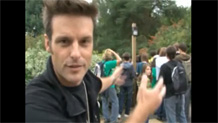
View a film of the first ever BioBlitz at the University of Exeter on our YouTube channel.
Alumnus Nick Baker launches Birds & Bees Campaign at the University of Exeter
On 9 October, broadcaster and naturalist Nick Baker led a group of over 150 volunteering students, academics, members of the public and Devon Wildlife Trust experts for the first ever Bioblitz at the University of Exeter.
The Bioblitz, a quick census of species at the University, will be expanded and future activity will be delivered in partnership with Devon Wildlife Trust and Exeter Wild City.
It aims to make the campus more wildlife friendly, enhance biological diversity, create wildlife corridors to enable animals to permeate through the city and make staff and students aware of the richness and variety of the natural environment.
Streatham is one of the most beautiful campuses in the UK and is of horticultural importance, but the grounds staff are also trying to cater for wildlife by leaving log piles, creating wild flower meadows and leaving areas of grass uncut to allow animals to move around safely. The campaign will focus on key species such as swifts, bumble bees and bats.
Nick Baker commented ‘This year is the International Year of Biodiversity and it is tragic that international targets to stop the rapid decline in the number of species have not been met. I am really pleased that the University is committed to the protection of biodiversity on campus as well as through its research. When I was a student here, there was not the same kind of interest for the protection of the natural environment as nowadays. I am delighted to see that so many students have shown their support today.’
The University’s student Guild president, Jonnie Beddall added ‘I am thrilled about the Birds & Bees campaign. It will give students extra opportunities to learn about the importance of biodiversity and develop new skills through surveying and volunteering. I hope it will give them a sense of place and pride in their local environment and community.’
During the event, Nick Baker was joined by his former lecturers Dr Clive Betts and Professor Charles Tyler. Numerous other academics and researchers from the College of Life and Environmental Sciences supported the event with their expertise. Mammalian biology lecturer and licensed bat handler Dr Fiona Mathews showed two bats that she had brought in from home, although brown long-eared, Daubenton’s, common pipistrelle, lesser horseshoe and soprano pipistrelle bats have been recorded on campus in the past. Dr Mark Ramsdale identified over fifty different fungi including some bright red fly agarics. The survey focussed on the area between the Laver Building and the Business School and generated some surprising discoveries. For the first time ever a Snipe was spotted on campus and a bumblebee was seen making a nest, unheard of at this time of year. Other beautiful finds were a dainty small copper butterfly and a kingfisher was seen swooping over a pond.
Poppy Leeder from The Natural Environment Research Council (NERC) concluded ‘We place an increasing emphasis on public engagement activities undertaken by NERC-funded researchers and so are keen to support any activities that are ready-made for people to get involved in - Bioblitzes are just that kind of event. We are very pleased that the University of Exeter is taking a lead.’
The Bioblitz was partially funded by student volunteering charity Vinspired and the catering was sponsored by Reed Hall. Nick Baker, who is appearing in the BBC’s Autumn Watch later this month, will stay involved with the Birds & Bees Campaign and other environmental sustainability projects.
For more information please contact Harriet Sjerps-Jones in Education Enhancement or Sustainability Manager Karen Gallagher.
Date: 14 October 2010
